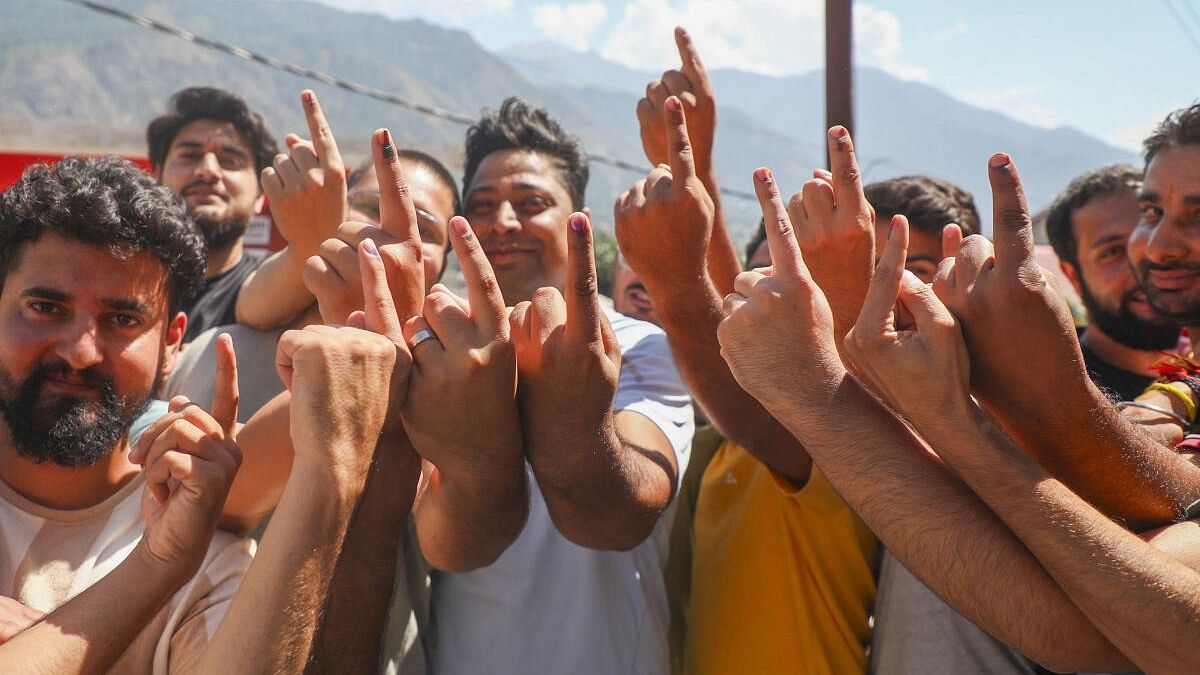
Voters show their fingers marked with indelible ink after casting votes during the first phase of Jammu and Kashmir Assembly elections, in Kishtwar, Wednesday, September 18, 2024.
Credit: PTI Photo
Srinagar: Jammu and Kashmir recorded a 61 per cent voter turnout across 24 constituencies in seven districts as phase one of the Union Territory's first Assembly elections in a decade concluded peacefully on Wednesday.
Amid pleasant autumn weather, polling began at 7 AM under tight security. Unlike previous elections marked by violence and calls for boycotts, this phase saw a calm atmosphere. Early in the morning, voters lined up at polling stations, with many women with their children waiting in lines to vote to exercise their franchise.
Chief Electoral Officer P K Pole said this is the highest voter turnout recorded in the last seven Lok Sabha and assembly elections in Jammu and Kashmir. He noted that the figures may increase further once final reports from remote areas and postal ballots are compiled.
Enthusiastic voters expressed their excitement at finally having the opportunity to elect their representatives. “Today is a festival of democracy. We are electing our leaders after ten years. A democratically elected government is better than bureaucratic rule,” said Muneer Ahmad Bhat from Pulwama.
Prime Minister Narendra Modi was one of many leaders urging voters to participate in large numbers in the "festival of democracy."
In a post on X, he specifically appealed to young and first-time voters.
Multi-layered security was implemented across the polling areas. The Kishtwar seat in Jammu recorded the highest turnout at 77.23 percent, while Pulwama had the lowest at 46.03 percent.
People’s Democratic Party (PDP) president and former chief minister Mehbooba Mufti, along with her daughter Iltija Mufti, cast their votes at a polling station in Bijbehara. Iltija is contesting from Bijbehara assembly segment while Mehbooba has opted out of polls saying the “reduced” power of the legislative assembly in the union territory would not allow her to fulfill her party’s agenda even if she were to become the chief minister.
Polling took place in four seats in Pulwama, two in Shopian, three in Kulgam, seven in Anantnag, as well as three each in Kishtwar, Doda, and two each in Ramban and Banihal.
These elections are significant as they are the first since 2014 and since the removal of Article 370 in August 2019, which stripped the region of its special status. This also marks the first assembly elections for Jammu and Kashmir as a Union Territory, following the division of the state into two UTs – Jammu and Kashmir and Ladakh.
Over 2.3 million voters will decide the fate of 219 candidates, including 90 independents, vying for 24 assembly segments in this phase. The subsequent phases are scheduled for September 25 and October 1, with vote counting on October 8.